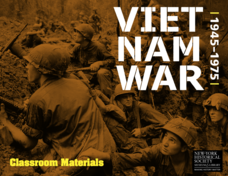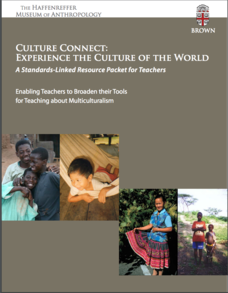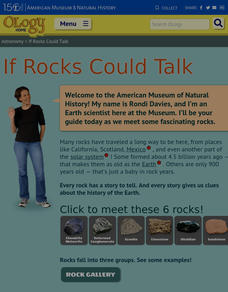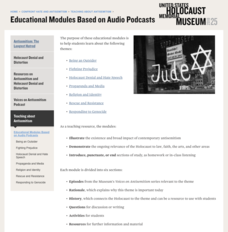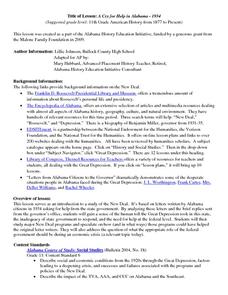Speak Truth to Power
Elie Wiesel: Speaking Truth to Genocide to Power
Invite your learners to discover the efforts of Night author Elie Wiesel to promote awareness of genocide in the world. After watching and reading an interview of Elie Wiesel, high schoolers work to create a living Holocaust museum by...
Art Institute of Chicago
Lesson Plan: A Writer’s Odyssey
Looking for a fresh approach to an end-of-unit project for The Odyssey? Check out a resource that has class members write their own hero's journey short story and then craft an illustration that depicts their tale. Apollonio di...
US Holocaust Museum
Life in Shadows: Hidden Children and the Holocaust
Hiding in the filth of a sewer, as a child, to avoid capture by Nazi soldiers—sounds scary! Scholars investigate the youngest victims of the Holocaust, the children. They research video clips and written sources from the Holocaust...
Biology Junction
Evolution – Diversity of Life
Scientists noticed animals with backbones share similar bone structure despite having different forms, such as fins, arms, and wings. Young scientists gain an appreciation for evolution by understanding the history of the theory. They...
Biology Junction
World of Insects: Characteristics, Orders, and Collecting
Every bug is an insect, but not all insects are bugs. A presentation lists the characteristics of insects, describes their body parts, and explains metamorphosis. It also details every order and includes photographs and multiple facts...
National WWII Museum
Women and the War: Supporting Historical Interpretations
Rosie the Riveter may be an iconic image from World War II, but not all historians agree on how the conflict affected women in the workplace. Individuals evaluate the writings of well-known historians on the topic, and then decide: Was...
American Museum of Natural History
Field Trip Mars
Fly around the Martian surface. Pupils view a presentation on the planet Mars featuring a flyover that shows different views of the surface where rovers have landed and explored on different missions. As individuals watch the images, the...
Museum of Tolerance
Can It Happen in America?: Taking Social Action
Class members investigate the Jim Crow Laws, Executive Order 9066, the Chinese Exclusion Act, and the Indian Removal Act to gather information about not only the challenges encountered by diverse groups of Americans, but their...
Channel Islands Film
Arlington Springs Man: Lesson Plan 4
West of the West's documentary Arlington Springs Man introduces viewers to the remarkable finds on Santa Rosa Island. Archaeologist have discovered on this small island that is part of the Channel island chain, human and pygmy mammoth...
Museum of Tolerance
Cultural Research Activity
Class members explore cultural diversity through a variety of texts that showcase the importance of traditions. Then, they interview their family members to research their own cultural background and write their findings on quilt pieces....
New York Historical Society
The Vietnam War: 1945-1975
Do pupils know that the Vietnam War spanned a period of 30 years? A war that long is bound to leave devastating effects. Help young historians develop a comprehensive understanding of the war through multiple units on the subject that...
Channel Islands Film
Dark Water: Lesson Plan 3 - Grades 6-12
After watching the documentary Dark Water about a traditional Chumash ceremony and reading a Chumash origin story, viewers are asked to create a coat of arms and to craft an essay that details a family tradition or their own origin story.
Oklahoma City Public Schools Native American Student Services
A Story of Survival: The Wampanoag and the English
Redesign your holiday celebrations with the aid of a lesson plan booklet packed with facts, images, maps, activities, and readings about the three-day feast that marked the English settlers' first successful harvest.
Smithsonian Institution
We Have a Story to Tell: Native Peoples of the Chesapeake Region
How did colonial settlement and the establishment of the United States affect Native Americans in the Chesapeake region? Your young historians will analyze contemporary and historical maps, read informational texts, and work in groups to...
Children's Museum of Indianapolis
Anne Frank: Facing Hatred, Daring to Dream
The stories of Anne Frank, Ruby Bridges, and Ryan White illustrate the power of children to make a difference. The three lesson in this must-have resource are designed to inspire young people to make a difference in their world....
Brown University
Culture Connect: Experience the Culture of the World
A rich series of activities introduces learners to the concept of culture by closely examining the behaviors, practices, and art of three distinct peoples: the Highland Maya of Guatemala, the Hmong of China and Southeast Asia, and the...
American Museum of Natural History
Being a Conservation Biologist: Eleanor Sterling
Eleanor Sterling responds to 21 questions posed by young learners about the challenges she faces as a woman conservation biologist. She also discusses her research of the aye-aye, an unusual animal that lives in Madagascar.
American Museum of Natural History
If Rocks Could Talk
Meet some interesting rocks. Learners discover information about the three types of rocks and different rocks that are within each group. They read imaginary interviews with six rocks as each rock tells the story of their formation and a...
US Holocaust Museum
Educational Modules Based on Audio Podcasts
Imagine hearing someone claim an event like the Holocaust never happened. Pupils use audio podcasts and reading passages to dive into the lives of those impacted by the Holocaust of World War II. Using the information they gather, class...
American Museum of Natural History
Journey to Deep Sea Vents
Take a deep dive into oceanography. The online interactive allows for learners to board a submersible to dive to the bottom of the ocean to investigate sea vents. On the way down, individuals see different marine life at different...
Alabama Department of Archives and History
A Cry for Help in Alabama - 1934
What should be the role of the federal government during an economic crisis? That is the question at the center of this introduction to a study of the New Deal. Class members examine letters to the state government asking for help,...
American Museum of Natural History
Being a Zoologist: Sandra Olsen
Are your students wild about horses? Then introduce them Sandra Olsen, a zooarchaeologist, who has been studying horses and the people who herd them. Ms Olsen responds to 15 interview questions and details how she goes about her...
Curated OER
Rudyard Kipling's "Rikki-Tikki-Tavi": Mixing Fact and Fiction
"Rikki-Tikki-Tavi," from The Jungle Book, offers young readers a chance to examine how Rudyard Kipling uses setting and personification to bring to life the brave mongoose who battles cobras to protect his family. Class members explore...
Curated OER
Unit Plan for The Catcher in the Rye —A “Place-Based” Approach
"People never notice anything." As part of their study of The Catcher in the Rye, class members adopt Holden Caulfield's approach and spend time as quiet observers of their surrounding, recording their observations/reflections in a...












